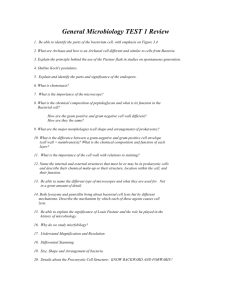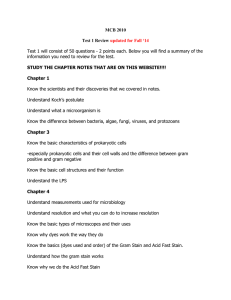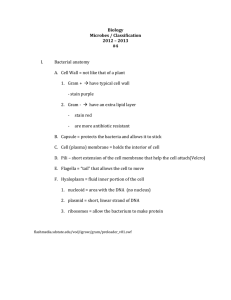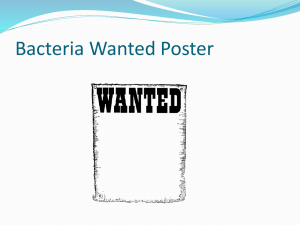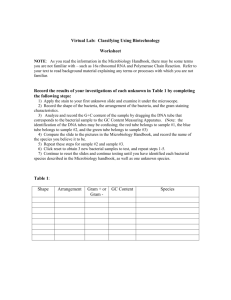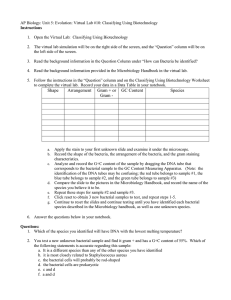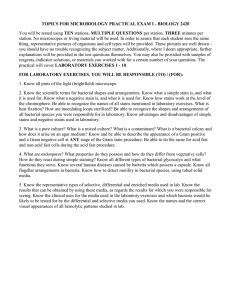Microbiology Worksheet: Microscopy, Staining, Bacteria, Parasites
advertisement
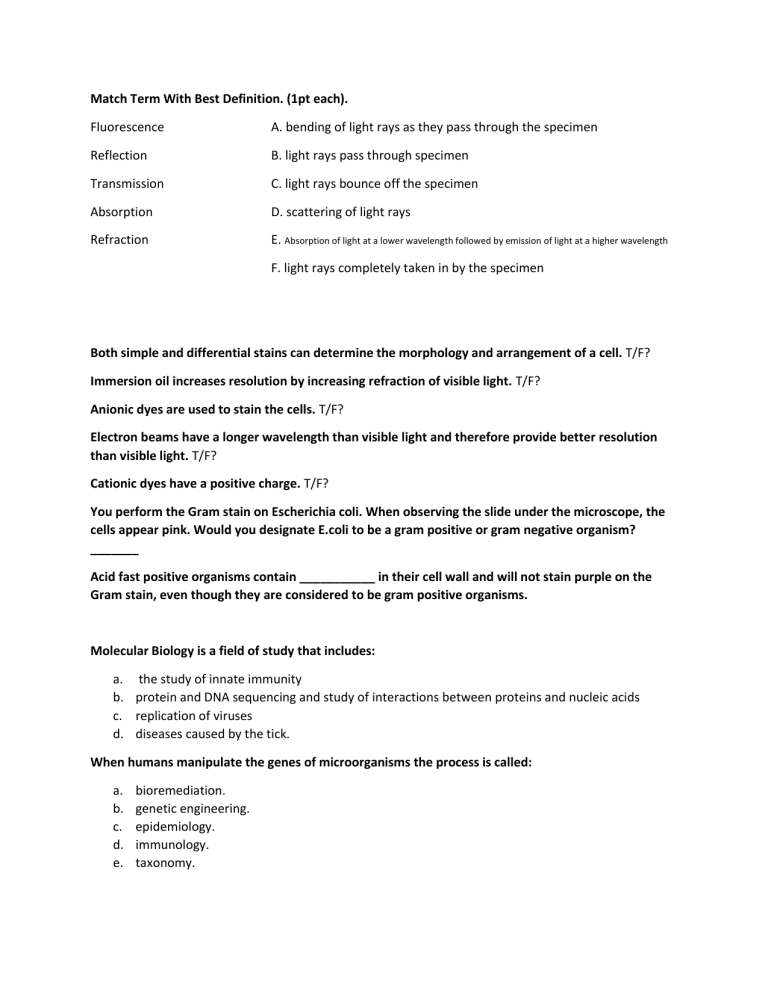
Match Term With Best Definition. (1pt each). Fluorescence A. bending of light rays as they pass through the specimen Reflection B. light rays pass through specimen Transmission C. light rays bounce off the specimen Absorption D. scattering of light rays Refraction E. Absorption of light at a lower wavelength followed by emission of light at a higher wavelength F. light rays completely taken in by the specimen Both simple and differential stains can determine the morphology and arrangement of a cell. T/F? Immersion oil increases resolution by increasing refraction of visible light. T/F? Anionic dyes are used to stain the cells. T/F? Electron beams have a longer wavelength than visible light and therefore provide better resolution than visible light. T/F? Cationic dyes have a positive charge. T/F? You perform the Gram stain on Escherichia coli. When observing the slide under the microscope, the cells appear pink. Would you designate E.coli to be a gram positive or gram negative organism? _______ Acid fast positive organisms contain ___________ in their cell wall and will not stain purple on the Gram stain, even though they are considered to be gram positive organisms. Molecular Biology is a field of study that includes: a. the study of innate immunity b. protein and DNA sequencing and study of interactions between proteins and nucleic acids c. replication of viruses d. diseases caused by the tick. When humans manipulate the genes of microorganisms the process is called: a. b. c. d. e. bioremediation. genetic engineering. epidemiology. immunology. taxonomy. The surgeon who advocated using disinfectants on hands and in the air prior to surgery was? a. b. c. d. e. Joseph Lister. Ignaz Semmelweis. Robert Koch. Louis Pasteur. Antonie van Leeuwenhoek. The Dutch merchant who made and used quality magnifying lenses to see and record microorganisms was? a. b. c. d. e. Francesco Redi. Antoni van Leeuwenhoek. Louis Pasteur. Joseph Lister. Robert Koch. Pasteur used swan-neck flasks in his experiments to prove that? a. b. c. d. e. air had "vital forces" capable of spontaneous generation. microbial fermentation could be used to make wine. particles in air was a source of living microorganisms. microorganisms could cause disease. microorganisms could be grown in laboratory infusions. The scientist who came up with the smallpox vaccine was? a. b. c. d. Louis Pasteur Joseph Lister Edward Jenner Alexander Fleming Which of the following is the correct way to write the scientific name of this bacterium? a. b. c. d. e. Staph Aureus Staphylococcus Aureus Staphylococcus aureus Staphylococcus Aureus S. Aureus Biotechnology is? a. b. c. d. the study of pharmaceuticals study of the immune system recombining genes in DNA strands used of microbes in environment and industry A gram positive cell contains lipopolysaccharide layer in its outer membrane. T/F? Bacterial cells can undergo both sexual and asexual reproduction. T/F? Movement toward a food source is called positive chemotaxis. T/F? The bacterial capsule protects the bacterial cell from the effects of osmotic pressure. T/F? Most ribosomes are found on the walls of the rough endoplasmic reticulum of both eukaryotic and prokaryotic cells. T/F? The function of an endospore is to allow bacteria to survive in extreme environments. T/F? The cell membrane of gram negative bacteria contains lipid A endotoxin. T/F? Animal cells placed in a hypertonic solution will swell up because of the movement of water into the cell. T/F? If you boil a sample of contaminated water for several hours, Bacillus and Clostridium would survive while other disease causing bacteria would die. T/F? Bacteria possessing a cluster of flagella at one end of the cell displays which flagellar arrangement? _____________ Match Eukaryotic Organelle With Its Function. (1pt each) Smooth endoplasmic reticulum Lysosome Ribosomes Mitochondria Rough endoplasmic reticulum Cell wall Golgi apparatus Organelle choices: A. B. C. D. E. F. G. H. I. J. protection from osmotic pressure transportation mainly of proteins throughout the cell regulates passage of materials cellular respiration protein synthesis processing and packaging of organic macromolecules lipid synthesis site of photosynthesis storage of metabolites and waste digestion of metabolites All of the following are correct about prokaryotes except? a. b. c. d. e. they are smaller than eukaryotes. they lack a nucleus. they are less complex than eukaryotes. they have organelles. they are found nearly everywhere. Match the following transport processes to either require ATP (energy) or does not require ATP: Simple diffusion ________ Exocytosis _______ Facilitated diffusion _______ Active transport ________ Osmosis _________ Axial filaments are responsible for motility in spirochetes. T/F? Which of the following is NOT associated with prokaryotic organisms? a. b. c. d. nucleoid glycocalyx cilia circular DNA Bacterial conjugation uses the _____________ to transfer DNA from one bacterial cell to another. A bacterial cell wall containing mycolic acid does not Gram stain accurately because the dyes used are anionic dyes. T/F? Match organism with appropriate classification.(1pt each) Trypanosoma Plasmodium Taenia (Tapeworm) Tinea Entamoeba Trichomonas Balantidium Choices: a. b. c. d. e. f. g. h. i. Mycetae [None] Sarcodina Mastigophora Anthropoda Nematoda Apicomplexa Ciliphora Platyhelminthes Match Genus Of Protista With Appropriate Form Of Movement. Choices: Balantidium A. Flagella Giardia B. Non-motile Entamoeba C. Pseudopodia Plasmodium D. Cilia The purpose of all eukaryotic parasites is to kill the host they inhabit. T/F? Schizogony is a type of sexual reproduction. T/F? The scolex of a tapeworm is used to attach to the host's intestinal tissue. T/F? Tinea pedis is more commonly known as Athlete's foot. T/F? Protozoans differ from true animals in that all protozoans are non-motile. T/F? If a parasite is facultative, it can be both free-living or parasitic. T/F? All fungi are comprised of tubular filaments called hyphae. T/F? The definitive host is the host in which the parasite reproduces asexually. T/F? Saprophobic organisms are autotrophic. T/F? The motile feeding stage of a protozoan is called a trophozoite. T/F? The definitive host of Plasmodium is a human. T/F? Fungi are non-motile. T/F? Roundworms are most often transmitted by ingesting undercooked pork. T/F? Giardia is a facultative parasite that is transmitted by ingesting the organism through contaminated water, food, or hands. T/F Bacterial cells can transfer DNA from one cell to another through the structure called the? a. b. c. d. Capsule Sex pilus Endospore Chloroplast The cytoplasmic membrane in bacteria is made up of? a. b. c. d. e. Phospholipids Membrane proteins Peptidoglycan A and B All of the above ______________ proposes that eukaryotic cells formed when a large anaerobic prokaryote engulfed a smaller aerobic prokaryotic cell. a. b. c. d. e. Theory of relativity Life theory Germ theory Endosymbiotic theory Spontaneous generation theory If you were to view staphylococci, you would see the following arrangement a. b. c. d. Single cell Two cells attached together A chain of cells A grape-like cluster of cells The archaea known as halophiles a. b. c. d. Require temperatures over 45 degrees C Need a highly acidic environment Require salt concentrations of 9% or higher to survive Require extremely low temperatures The presence of mycolic acid in the cell wall is a characteristic of a. b. c. d. e. Clostridium Mycoplasma Staphylococcus Mycobacterium Klebsiella ________________ lacks a cell wall. a. b. c. d. e. Bacillus Mycobacterium Staphylococcus Mycoplasma Klebsiella The common method of asexual reproduction in bacteria is? ____________ The classification of prokaryotes in Bergey's Manual of Systematic Bacteriology is largely based on a. b. c. d. Gram stain rRNA sequences Cellular morphology Disease they cause The only group under Protozoa that is non motile is _________. A negative sense strand RNA can be carried to the host cell's ribosome and translated to protein. T/F? The stage of virus infection called (assembly/entry/synthesis) is the stage most dependent on host cell proteins. Reverse transcriptase is associated with which of the following? a. b. c. d. Retrovirus Lytic cycle Reverse transcriptase Transcriptase
